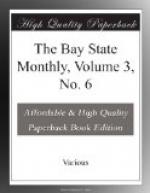Events then transpired rapidly. So far, Samuel Adams was almost wholly alone in the idea of independence, but it was declared by Congress less than two years later. For more than twenty years longer, Adams continued in public life, but his greatest work was before the Declaration of Independence rather than after. There were times when the cause of the patriots must have fallen through but for the nerve and skill of this man. Bowdoin, Cushing, Hancock, Otis, and even John Adams could not have been thoroughly trusted in the last years of the colony to bring affairs to a successful issue. But Samuel Adams was fitted by intellect and character, adroitness and courage, tireless energy and by never failing devotion to the public good, to be the man for the time.
When America had become a Republic, and Adams had returned from Congress to his native town, he served as presiding officer of the Senate, then as lieutenant governor, and, upon the death of Hancock, governor, to which office he was several times chosen by the people. He died in 1803, and his dust lies to-day in the old Granary Burying Ground, close by the common grave of the four victims of the Boston Massacre.
The statue in bronze now standing in Adams Square is noble in design, and appropriate for situation. It is in almost the busiest position of the great city, and daily across its shadow pass tens of thousands of mechanics and artisans—the class of men with whom Samuel Adams used to love to hold intercourse. The Old State House and Faneuil Hall are only a stone’s-throw distant from the statue, but the face is not looking in the direction of either; it is turned directly toward the visible shaft of granite on Bunker Hill—the monument which marks the first great battle in the struggle for that Independence toward which, in all his labors for so many years, the eyes of Samuel Adams were ever turned.
[Footnote 1: For the reproduction of the above portrait and the two following views of the Old State House, we are indebted to the courtesy of Messrs. Ticknor & Co., the well-known Boston publishers.—Ed.]
[Footnote 2: Samuel Adams. By James K. Hosmer, 1 vol., 442 pp. American Statesmen Series. Boston: Houghton, Mifflin & Co. 1883.]
* * * * *
AUTHORITATIVE LITERATURE OF THE CIVIL WAR.
BY GEORGE LOWELL AUSTIN.
II.
THE LIFE AND PUBLIC SERVICES OF ABRAHAM LINCOLN, sixteenth President of the United States: together with His State Papers, including his Speeches, Addresses, Messages, Letters, and Proclamations, and the closing Scenes connected with his life and death. By Henry J. Raymond. To which are added Anecdotes and Personal Reminiscences of President Lincoln, by Frank B. Carpenter, with a steel portrait, and other illustrations, 1 vol. octavo, pp. 808.




